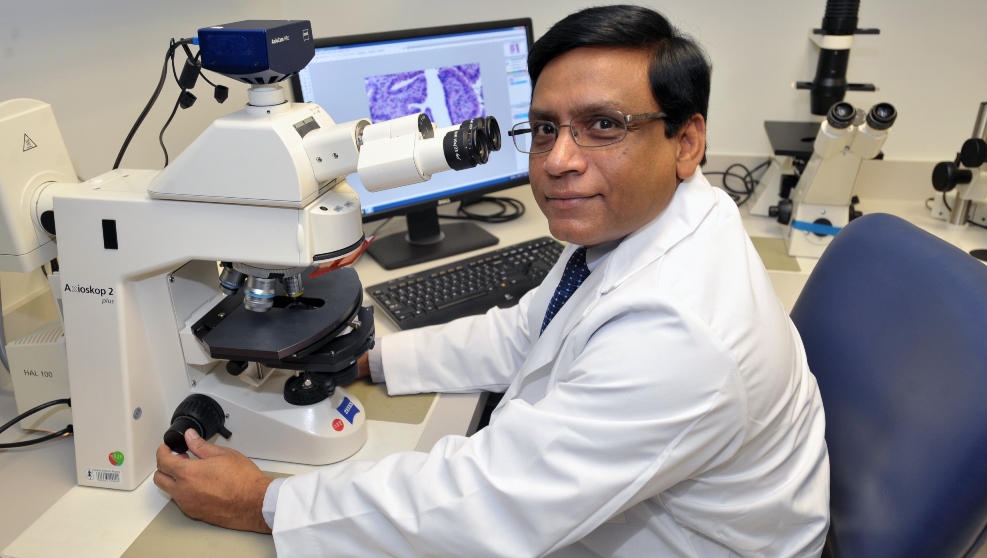
The Eunice Kennedy Shriver National Institute of Child Health and Human Development of the National Institutes of Health awarded the Wayne State University School of Medicine a new, five-year $1,612,315 grant (R01HD088549-01A1) that could have far-reaching effects on maternal and fetal health, including helping prevent acute and long-term health risks associated with pregnancy complications such as preeclampsia and preterm labor.
Associate Professor of Obstetrics and Gynecology Nihar Nayak, D.V.M., Ph.D., the study's principal investigator, last month launched the project, which examines the molecular control of the development of placental trophoblasts, a process essential to normal pregnancy, and how aberrations in normal trophoblast development can lead to a spectrum of pregnancy disorders, from placental abruption in which the placenta detaches from the womb, to preeclampsia, both common and life-threatening disorders.
The work will define how the angiogenesis regulator vascular endothelial growth factor, or VEGF, regulates trophoblast differentiation and approaches for altering VEGF function at different stages of pregnancy to safely prevent or alleviate pregnancy complications.
"Every year, more than 300,000 women die from pregnancy complications, and more 6.5 million more suffer complications that result in life-long disability, for which $41 billion is spent on health care costs," Dr. Nayak said. "However, little is known about the development and differentiation of the cells - extravillous trophoblasts, or EVTs - at the heart of most human pregnancy complications. Our overarching goal is to develop mechanism-based strategies to prevent, diagnose and treat pregnancy complications associated with faulty trophoblast development."
The proposed experiments are based on a novel concept linking VEGF-induced abnormal trophoblast differentiation with a variety of pregnancy complications, depending on local VEGF level and the stage of placental development when the cells are exposed to excess VEGF. The novel unifying theory provides a previously unappreciated molecular mechanism for upregulation of the levels of sFlt1 - proteins that act as receptors of VEGF - resulting from the expansion of a subset of EVTs due to faulty trophoblast differentiation, a defect common to several pregnancy complications, and provides insights on defects that are unique to each complication of pregnancy, essential for development of specific treatment strategies for each disease.
The work also represents the first systematic, experimentally-controlled analysis of the stage-specific functions of any molecule in pregnancy, and development of novel methods for nanoparticle-mediated delivery of morpholinos, a molecule, to specific cells in the placenta for pregnancy stage-specific treatment of various pregnancy disorders.
Manipulation of VEGF signaling has become a common treatment for many diseases, including cancer and several ocular diseases. The WSU-based team's work will provide a foundation for how and when similar interventions could improve pregnancy outcomes.
Complications of pregnancy, including preeclampsia, intrauterine growth restriction, preterm labor with intact membranes, preterm pre-labor rupture of membranes, placental abruption and late spontaneous abortion, have an enormous impact on the health of women and children worldwide.
"Such findings will have direct translational importance in developing new strategies for prediction, early diagnosis and treatment of several pregnancy diseases. These studies are also expected to move the field vertically at both the basic and applied levels," Dr. Nayak said. "We are very excited about this funding. Our research has challenged a longstanding dogma in the field about the causes of preeclampsia. Now, our work has become accepted in the field and the premise upon which this R01 grant application was based has been published in a highly prestigious journal, the Journal of Clinical Investigation.